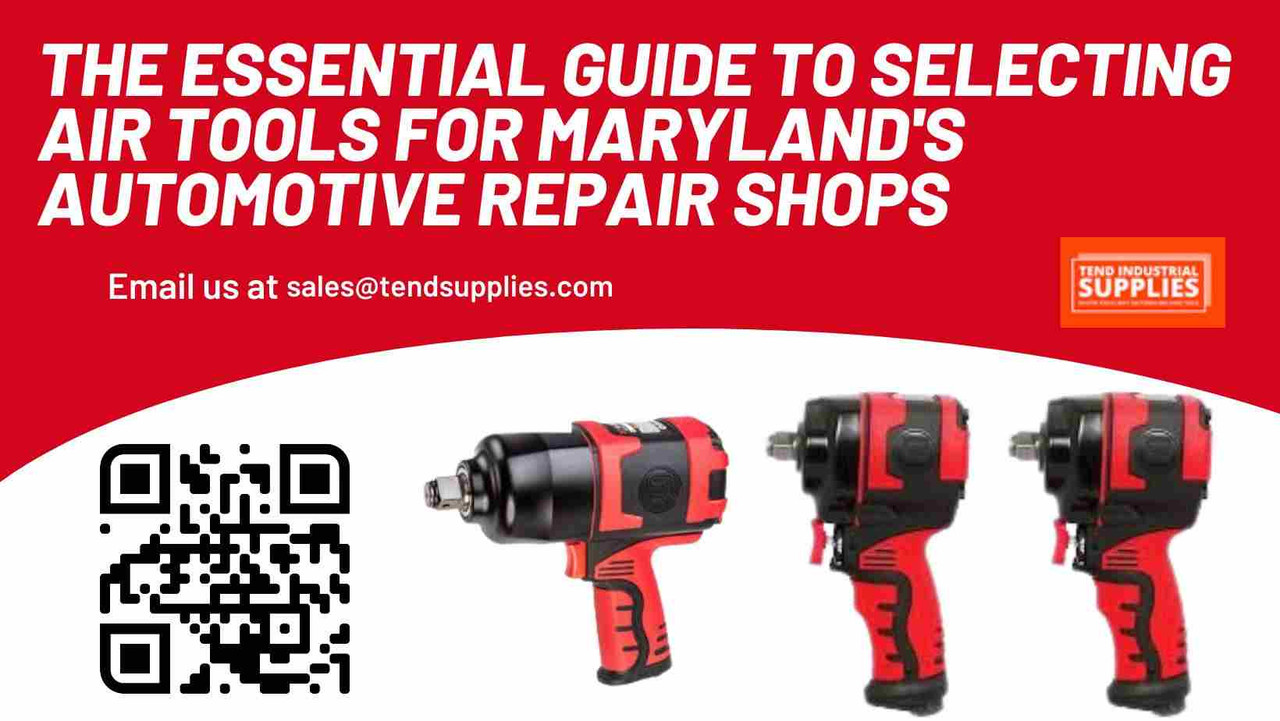The Essential Guide to Selecting Air Tools for Maryland's Automotive Repair Shops
In Maryland’s bustling automotive industry, the right air tools can significantly improve the efficiency and quality of service offered by repair shops. This guide provides an in-depth look at how to choose the best air tools to meet the demands of daily automotive repairs and ensure durability, reliability, and performance.
Understanding Air Tools for Automotive Repair
Air tools, or pneumatic tools, are powered by compressed air supplied by an air compressor. They are favored in automotive repair shops for their power, versatility, and durability. Common air tools used in these settings include impact wrenches, ratchets, air hammers, and spray guns.
Factors to Consider When Choosing Air Tools
- Power and Torque Needs: Consider the types of jobs the tools will be used for. High-torque tools are essential for loosening tight bolts and screws.
- Tool Weight and Ergonomics: Lightweight tools reduce operator fatigue, which is crucial for mechanics who use tools for extended periods.
- Durability: High-quality materials and construction ensure that tools can withstand the rigors of a busy shop environment.
- Air Compressor Compatibility: Ensure the air tools are compatible with the shop’s existing air compressor specifications, including pressure and CFM (cubic feet per minute).
Top Air Tools for Maryland’s Automotive Shops
- Impact Wrenches: Ideal for removing lug nuts and engine bolts.
- Shinano SI-1600: Known for its high torque and durability, perfect for heavy-duty applications.
- Ingersoll Rand 231C: A classic choice, offering reliable performance and power.
- Air Ratchets: Best for working in tight spaces where manual ratchets cannot reach.
- Snap-On FAR25: Lightweight and powerful, designed for ease of use in confined spaces.
- Chicago Pneumatic CP824: Compact and efficient, suitable for various automotive tasks.
- Air Hammers are useful for cutting through rusted components and other hard materials.
- Sunex SX243: High blows per minute, excellent for heavy-duty chipping and cutting.
- Ingersoll Rand 119MAXK: Low vibration design, providing comfort during extended use.
- Spray Guns: Essential for auto body work and painting.
- DeVilbiss Finishline 4: Precision-engineered for professional-grade automotive painting.
- Iwata W-400: Known for its superior atomization and smooth finish.
Maintenance Tips for Air Tools
- Regular Lubrication: Keep air tools lubricated to prevent wear and ensure smooth operation.
- Proper Storage: Store tools in a clean, dry environment to prevent rust and corrosion.
- Routine Inspections: Check tools regularly for signs of wear or damage.
- Filter Changes: Ensure clean air filters to maintain efficient airflow and tool performance.
- Hose Maintenance: Inspect air hoses for leaks and cracks, replacing them as necessary to ensure optimal air delivery.
Advantages of Using Premium Air Tools
- Enhanced Performance: Premium air tools provide superior performance, ensuring jobs are completed more efficiently.
- Longevity: High-quality materials and construction lead to longer tool life, reducing the need for frequent replacements.
- Reduced Downtime: Reliable tools mean less time spent on repairs and maintenance, leading to increased productivity.
- Safety: Well-built tools reduce the risk of accidents and injuries, promoting a safer work environment.
Brand Comparisons: Shinano vs. Other Brands
- Shinano: Known for precision engineering and robust performance, Shinano tools are a top choice for professionals.
- Ingersoll Rand offers a wide range of reliable tools and a strong reputation in the industry.
- Snap-On: Renowned for durability and ergonomic design, Snap-On tools are favored by many mechanics.
- Chicago Pneumatic: Provides cost-effective solutions without compromising on quality.
FAQs
- What air pressure is needed for most automotive air tools?
- Most automotive air tools require between 90 and 120 PSI.
- How often should I lubricate my air tools?
- Lubricate your tools after every use to maintain optimal performance.
- Can I use the same tools for automotive and woodworking applications?
- While some tools might overlap, using tools specifically designed for automotive applications is best due to their unique requirements.
- What is the most versatile air tool for an automotive repair shop?
- The air impact wrench is highly versatile and essential for various tasks in the automotive repair industry.
- How do I choose the right size air compressor for my tools?
- Match the air compressor’s output with the highest CFM requirement of your tools at the required PSI.
Choosing the right air tools for your automotive repair shop in Maryland is crucial for increasing efficiency, reducing downtime, and improving overall customer satisfaction. You can ensure that your shop operates smoothly and efficiently by selecting the appropriate tools and maintaining them properly.
Visit Tend Industrial Supplies or contact us at sales@tendsupplies.com for more information on the best air tools for your needs and to explore our wide range of high-quality automotive repair tools.






